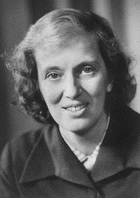
Dorothy Hodgkin (born Crowfoot) was awarded the Nobel prize in chemistry in 1964 "for her determination by X-ray techniques of the structures of important biochemical substances", one of only three women ever to do so in the 100 year history of the prize. The other awardees were Marie Curie in 1911 and her daughter Iréne Joliot-Curie in 1935.
She made huge advances in the method of structure determination of large organic molecules using X-ray techniques and went on to determine the structures of many substances. These included penicillin, for which it was essential that its composition be known so that it and similar antibiotics could be synthesised for medical use.
She also overcame hostility and prejudice in a male dominated field to become a leader and innovator in the use of X-ray techniques. She was named a fellow of the Royal Society, Britain's leading scientific organisation in 1947 and was awarded the Order of Royal Merit by Queen Elizabeth II in 1965, the first woman to be bestowed this honour since Florence Nightingale.
